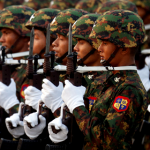The period since February 1, 2021 has been a long nightmare. There are three camps now in Myanmar: the military, which wields power in major towns; the opposition named the National Unity Government (NUG) and its partners, which call the shots in the countryside; and the ethnic groups on the geographic periphery, which are divided into those which are pro-military, pro-NUG, or neutral.
Peaceful protests of the early post-coup months gave way to violent resistance, with frequent clashes occurring in many parts from the west to the east and the heartland. Insecurity is widespread. The deep divide is seen in the air force bombing the citizens and the people’s militias killing government soldiers and policemen. The people’s true hero, Aung San Suu Kyi, whose party scored a decisive victory in the 2020 elections, is now 77 and is serving a 33-year-long prison sentence in solitary confinement. The military and the NUG have termed each other as “terrorists”, thus ruling out dialogue. Without dialogue and the will to compromise, there can be no reconciliation.
Meanwhile, the economy traverses a difficult terrain, marked by a sharp decline in GDP, and a massive rise in poverty, unemployment and inflation. The currency is in free fall. Myanmar thus finds itself mired in a total impasse today.
Many Burmese people tend to place their hopes on some miraculous assistance from the outside world. Unfortunately, the international community stands fractured while coping with the crisis in Myanmar. To the West, it is a clear-cut case of a repressive and power-hungry army suppressing the people, depriving them of their democratic rights. The western nations react through condemnation at the United Nations, targeted sanctions against the junta, and generous material assistance to the opposition. On December 21, 2022, the UN Security Council adopted Resolution 2669, expressing deep concern about the situation and urging the release of all political prisoners. It attracted no veto, only abstentions by China, Russia, and India. But even with such rare unity, the UN has failed to move the military, known for its stubbornness and inflexibility.
The UN is supportive of ASEAN, ever keen to play a mediator’s role in Myanmar. But the Myanmar government refuses to cooperate with ASEAN. In April 2021, Commander-in-Chief Min Aung Hlaing accepted ASEAN’s ‘Five-Point Consensus’ formula as a way out, but later he resiled from it, refusing to make any concessions to the opposition. The ASEAN persists, but only in form. This is because behind its façade of unity lies serious differences between the anti-military group (Indonesia, Malaysia, Singapore, the Philippines and Brunei) and the pro-military group (Thailand, Vietnam, Laos and Cambodia). A near-miracle was expected from the new chair, Indonesia. However, Jakarta realises its limitations and believes that the problem lies within, which Myanmar’s political class itself will have to resolve.
China and Russia are busy forging close cooperation with the government. China has extensive interests ranging from the strategic to economic domains. It dislikes instability, but has enough partners enabling it to keep consolidating its position. Shunned by the West due to the war in Ukraine, Russia has found a willing partner in Myanmar’s generals who need Russian arms, training and political support. The more the West pressures the junta, the tighter becomes the latter’s embrace of Beijing and Moscow.
As the world’s largest democracy, India desires a stable and prosperous Myanmar where democracy flourishes. But realpolitik comes in the way. New Delhi follows the policy of dealing with the government of the day. Hence it does business with the generals, much to the NUG’s discomfiture. Besides, India has solid security and economic interests. It needs assistance to tackle the Indian Insurgent Groups sheltered in Myanmar; its mega infrastructure projects aimed at the people’s welfare require the authorities’ cooperation; and it is resolved to stay in competition with China for influence in Myanmar.
India’s Myanmar experts are hardly helping matters by being divided and offering contradictory advice. One group wants the Modi government to stay the course. The other advocates a studied opening towards the NUG and the ethnic groups. This camp even wants India to play a mediator’s role in the imbroglio. New Delhi has never attempted this before and is unlikely to consider it now. India’s options are limited. It knows that the root causes of the political problem lie in Myanmar’s soil. The responsibility for finding a solution, therefore, rests with its leadership.
The big question now is whether the military can hold elections in August. Forget ‘free and fair’ elections. The sheer logistics of holding elections pose a serious challenge given the opposition’s plans to disrupt them. Even if elections are held, they are unlikely to win credibility or legitimacy at home or abroad. If the military defers them indefinitely, it would signal the country’s return to square one. I wish I could spot some light at the end of the tunnel.
Rajiv Bhatia is Distinguished Fellow for Foreign Policy Studies, Gateway House, and a former ambassador.
A version of the article earlier appeared in The Hindu.


